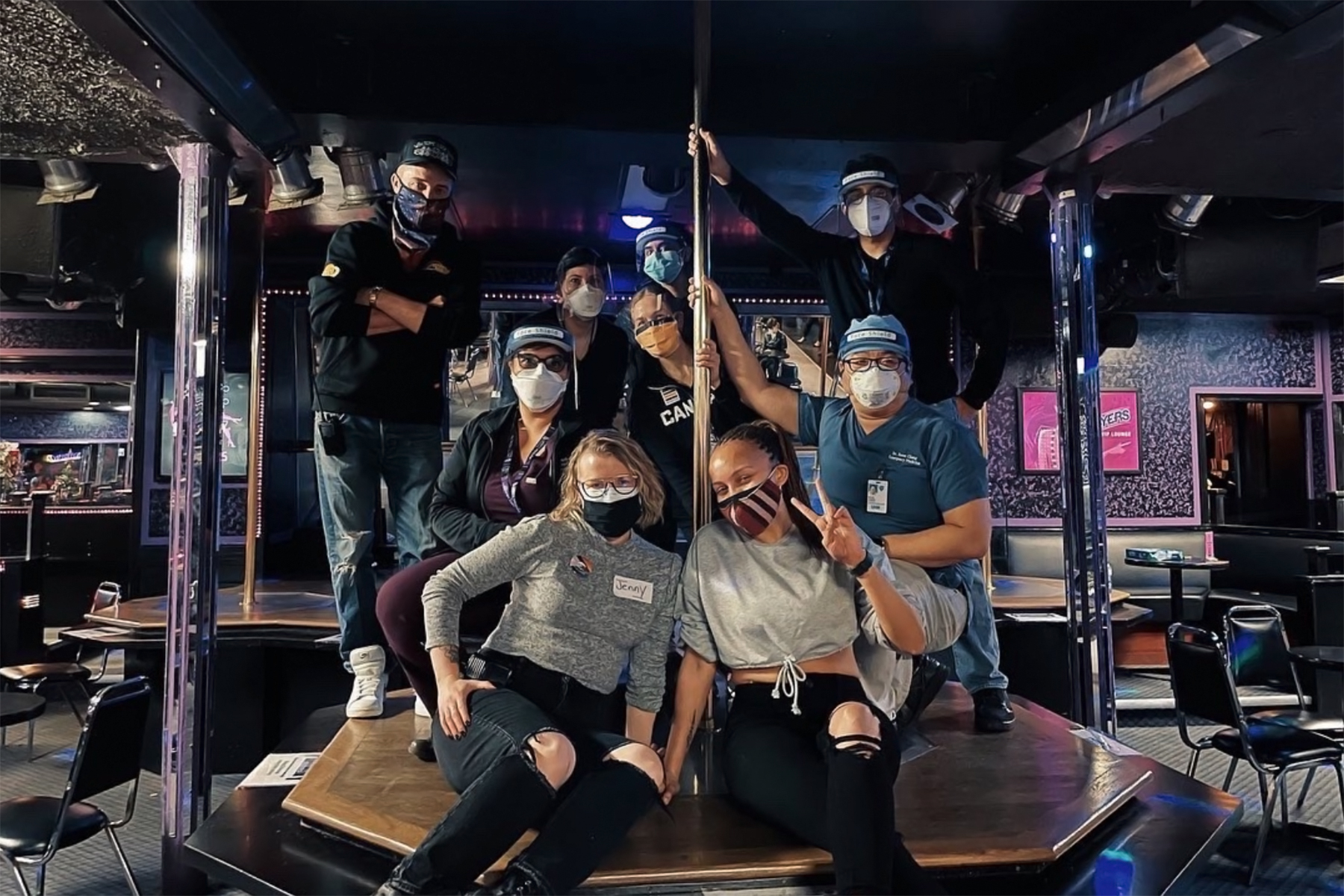The early days of the pandemic were an incredibly difficult time for Toronto-area sex workers. With people out of work and struggling to find relief aid, as well as policing efforts ramping up in the downtown area, many sex workers struggled to keep their heads above water.
“When Covid hit we were dealing with this wave of criminalization,” says Ellie Ade Kur, a clinic organizer and board member at Maggie’s Sex Workers Action Project, a sex worker justice organization in Toronto. “We couldn’t access government aid. We had to organize an emergency fund. We had to do a food box program. We had to organize our own mental health services to make sure our people had access to pandemic relief. Sex workers were totally left behind by political leaders.”
Then, following an outbreak at the Toronto strip club the Brass Rail Tavern in August 2020, just a few months after Ontario issued a mandate allowing businesses to reopen, Ontario Premier Doug Ford made matters worse by making stigmatizing comments about the club itself. “I feel sorry for people when they go to their house and tell them that they were at the Brass Rail,” he told reporters. “That’s who I feel sorry for. Sorry for the spouse, seriously.” Toronto mayor John Tory also chimed in with his own disparaging remarks, questioning why strip clubs “have to be open” during the pandemic and stating, “It’s ironic that small theaters that can’t open for performances yet these places are open for what they offer — and I’m not making a judgment on that, I am just commenting on the nonsensical nature of that.” The clubs were shut down for a second time the following September.
Such comments were infuriating to Kur, who found them reminiscent of the government’s response to the HIV/AIDS epidemic in the 1980s, which also shifted the blame for transmission of the virus to sex workers. “This whole idea that sex workers are spreaders of disease, that they’re shameful — there’s a similar sentiment coming out during the pandemic targeting and blaming sex workers throughout the pandemic,” she tells Rolling Stone.
It was precisely these dismissive remarks about sex workers and their means of income that inspired Maggie’s to fight back by giving back. Since last summer, Maggie’s has managed to vaccinate at least 3,600 people against Covid-19 by holding low-barrier vaccine clinics at various locations in the downtown Toronto area, including churches, bathhouses, and shelters. Yet it has attracted the most attention for its vaccine clinics at strip clubs, which Ade Kur says was a part of a conscious effort to “push back against the narrative” surrounding sex workers during the pandemic.
“We wanted to speak back to it and say, actually, sex workers are deeply invested in public health and always have been,” she says.
For the past year, Maggie’s has been partnering with health clinics and agencies in the Toronto area to host low-barrier vaccine drives, meaning that those looking to get vaccinated do not have to offer traditional forms of identification, such as proof of address or health care coverage, in order to get a jab. As more people have gotten vaccinated over the past year, Maggie’s has pivoted to booster drives, though Jenny Duffy, the board chair at Maggie’s, says she has also seen people coming out to get their first and second doses as well, particularly seniors who were unable to get the vaccine elsewhere.
The drives were specifically intended to target those who may be unable to produce documentation in order to get vaccinated, such as the unhoused or members of undocumented communities, as well as sex workers who may be concerned about being doxxed or outed. “Part of the pull in terms of coming to these clinics is we don’t ask for ID,” says Ade Kur.
Maggie’s is not the only organization promoting strip club vaccine drives specifically: the Hustler Club in Las Vegas, for instance, has hosted drive-thru vaccine clinics, as well as promotional nights offering patrons a free lap dance in exchange for getting vaccinated. Yet in the midst of a pandemic that has largely left marginalized people behind, Maggie’s has found an innovative way to reach underserved communities where they are, dispelling stigmatizing beliefs about the sex industry in the process.
Maggie’s held its first vaccine drive in June 2021 at a local church. There was some backlash within the Toronto community, with one group of anti-vaxxers picketing across the street, says Duffy. “People were saying the strip club is a gimmick to trick you into getting the vaccine, that it’s a dirty place to get a vaccine, or that strippers are giving out the vaccine,” she says. (This is not true — Maggie’s partners with local health care clinics and agencies to administer the vaccine — but as Duffy wryly notes, the critique is somewhat ironic, as it’s not uncommon for sex workers to also work in the health care industry. “You can go to any clinic and it’s a sex worker who’s giving you a checkup,” she says.)
When Maggie’s approached clubs like Zanzibar’s and Fillmore’s, another strip club in downtown Toronto, the proprietors were more than happy to relinquish the space to get people vaccinated. Indeed, the drives were also intended to draw attention to the fact that during the closures, strip clubs were also required to pay the city licensing fees, despite the fact that other independent contractors were exempt from having to pay such fees during the pandemic.
At Zanzibar’s specifically, the stage is too small to accommodate people getting their shots, so the actual vaccines are administered in the gallery area; the VIP area is reserved for pharmacy workers to unload the vaccine doses. Maggie’s tries to time its drives to overlap with club hours, so dancers and their family members can get a shot on the way to or from work. Yet the drives are targeted at all members of the community who may be unable or unwilling to show identification in order to get a shot. “We have a lot of sex workers living out of encampments and public parks, or sex workers who don’t have documentation, or sex workers who might be outed who may have quite a bit to lose,” Ade Kur says.
By waiving the requirement to show identification to get a shot, Maggie’s is able to directly target a vastly underserved community. “In some weird way, these quite flashy strip clubs are a very publicly visible location,” she says. “But there’s this low barrier that provides this sort of anonymity for people.” Ade Kur says she has spoken to people in undocumented communities who have traveled up to five hours to get a shot at one of Maggie’s clinics, and the organization has also managed to persuade many vaccine-hesitant individuals as well. “We were hearing from a lot of construction workers and transit workers and a lot of folks that focus on manual labor — these are communities that have a large population of anti-vaxxers in Toronto,” she says. “Because they’re in spaces like strip clubs, they’re good at opening the door to people who hadn’t considered getting the vaccine in the first place.”













